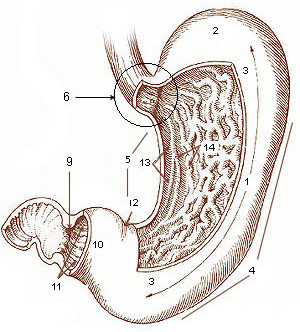Gastrectomy
Gastrectomy[edit | edit source]
A gastrectomy is a surgical procedure where all or part of the stomach is removed. This operation is typically performed to treat stomach cancer, severe peptic ulcers, or other stomach-related diseases. The procedure can be classified into several types depending on the portion of the stomach that is removed.
Types of Gastrectomy[edit | edit source]
Partial Gastrectomy[edit | edit source]
A partial gastrectomy involves the removal of a portion of the stomach. This is often done to remove a tumor or to treat severe ulcers. The remaining part of the stomach is then reconnected to the small intestine.
Total Gastrectomy[edit | edit source]
In a total gastrectomy, the entire stomach is removed. The esophagus is then directly connected to the small intestine. This procedure is more extensive and is usually reserved for cases where cancer has spread throughout the stomach.
Sleeve Gastrectomy[edit | edit source]
A sleeve gastrectomy is a type of bariatric surgery where a large portion of the stomach is removed, leaving a tube-like structure. This procedure is primarily used to treat obesity.
Indications for Gastrectomy[edit | edit source]
Gastrectomy is indicated for several conditions, including:
- Stomach cancer
- Severe peptic ulcer disease
- Non-cancerous tumors
- Obesity (in the case of sleeve gastrectomy)
Surgical Procedure[edit | edit source]
The procedure can be performed using open surgery or laparoscopic surgery. In open surgery, a large incision is made in the abdomen to access the stomach. In laparoscopic surgery, several small incisions are made, and the surgery is performed using a camera and special instruments.
Postoperative Care[edit | edit source]
After a gastrectomy, patients may need to stay in the hospital for several days. Nutritional support is crucial, as the stomach plays a significant role in digestion. Patients may need to follow a special diet and take vitamin supplements to compensate for the reduced absorption of nutrients.
Complications[edit | edit source]
Potential complications of gastrectomy include:
- Infection
- Bleeding
- Nutritional deficiencies
- Dumping syndrome, where food moves too quickly from the stomach to the small intestine
Related Pages[edit | edit source]
Transform your life with W8MD's budget GLP1 injections from $125
W8MD offers a medical weight loss program NYC and a clinic to lose weight in Philadelphia. Our W8MD's physician supervised medical weight loss centers in NYC provides expert medical guidance, and offers telemedicine options for convenience.
Why choose W8MD?
- Comprehensive care with FDA-approved weight loss medications including:
- loss injections in NYC both generic and brand names:
- weight loss medications including Phentermine, Qsymia, Diethylpropion etc.
- Accept most insurances for visits or discounted self pay cost.
- Generic weight loss injections starting from just $125.00 for the starting dose
- In person weight loss NYC and telemedicine medical weight loss options in New York city available
- Budget GLP1 weight loss injections in NYC starting from $125.00 biweekly with insurance!
Book Your Appointment
Start your NYC weight loss journey today at our NYC medical weight loss, and Philadelphia medical weight loss Call (718)946-5500 for NY and 215 676 2334 for PA
Search WikiMD
Ad.Tired of being Overweight? Try W8MD's NYC physician weight loss.
Semaglutide (Ozempic / Wegovy and Tirzepatide (Mounjaro / Zepbound) available. Call 718 946 5500.
Advertise on WikiMD
|
WikiMD's Wellness Encyclopedia |
| Let Food Be Thy Medicine Medicine Thy Food - Hippocrates |
Translate this page: - East Asian
中文,
日本,
한국어,
South Asian
हिन्दी,
தமிழ்,
తెలుగు,
Urdu,
ಕನ್ನಡ,
Southeast Asian
Indonesian,
Vietnamese,
Thai,
မြန်မာဘာသာ,
বাংলা
European
español,
Deutsch,
français,
Greek,
português do Brasil,
polski,
română,
русский,
Nederlands,
norsk,
svenska,
suomi,
Italian
Middle Eastern & African
عربى,
Turkish,
Persian,
Hebrew,
Afrikaans,
isiZulu,
Kiswahili,
Other
Bulgarian,
Hungarian,
Czech,
Swedish,
മലയാളം,
मराठी,
ਪੰਜਾਬੀ,
ગુજરાતી,
Portuguese,
Ukrainian
Medical Disclaimer: WikiMD is not a substitute for professional medical advice. The information on WikiMD is provided as an information resource only, may be incorrect, outdated or misleading, and is not to be used or relied on for any diagnostic or treatment purposes. Please consult your health care provider before making any healthcare decisions or for guidance about a specific medical condition. WikiMD expressly disclaims responsibility, and shall have no liability, for any damages, loss, injury, or liability whatsoever suffered as a result of your reliance on the information contained in this site. By visiting this site you agree to the foregoing terms and conditions, which may from time to time be changed or supplemented by WikiMD. If you do not agree to the foregoing terms and conditions, you should not enter or use this site. See full disclaimer.
Credits:Most images are courtesy of Wikimedia commons, and templates, categories Wikipedia, licensed under CC BY SA or similar.
Contributors: Prab R. Tumpati, MD



